Sociology Assignment: Analysis of Ethics and Democracy in Ireland
VerifiedAdded on 2022/08/08
|5
|1280
|27
Homework Assignment
AI Summary
This sociology assignment delves into two key areas: professional ethics and the democratic framework of Ireland. The first part examines the values that underpin a professional code of conduct, emphasizing honesty, integrity, and a commitment to societal contribution. It discusses how these values manifest in the workplace and the importance of avoiding conflicts between personal and professional life. The second part analyzes the structure of the Irish government, highlighting the roles of the President, the Houses of Parliament, and the Constitution. It explains the legislative process, from the introduction of a bill to its enactment, and outlines the fundamental rights of Irish citizens. The assignment references key sociological concepts and provides a comprehensive overview of both ethical considerations and the functioning of a democratic system.
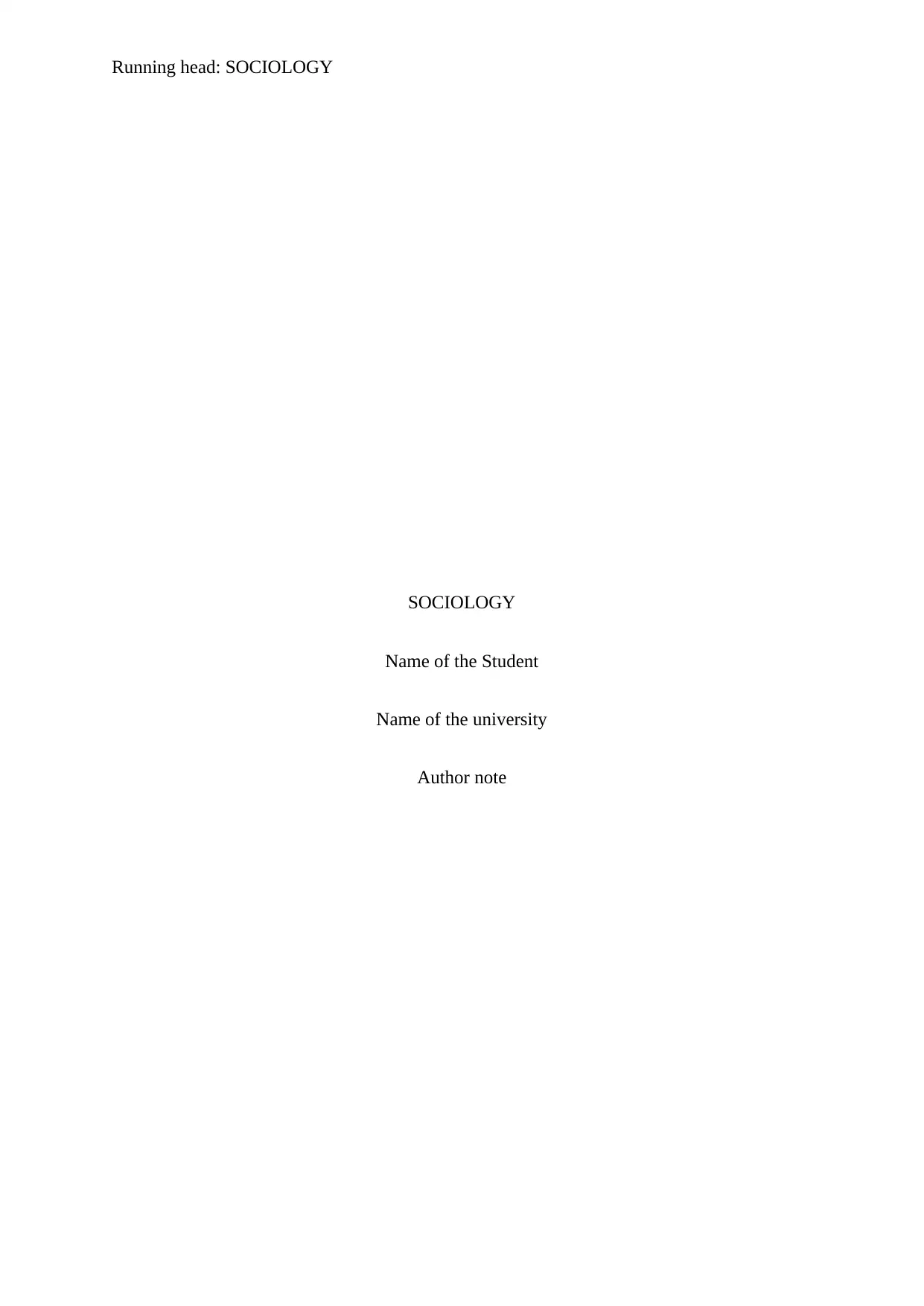
Running head: SOCIOLOGY
SOCIOLOGY
Name of the Student
Name of the university
Author note
SOCIOLOGY
Name of the Student
Name of the university
Author note
Paraphrase This Document
Need a fresh take? Get an instant paraphrase of this document with our AI Paraphraser
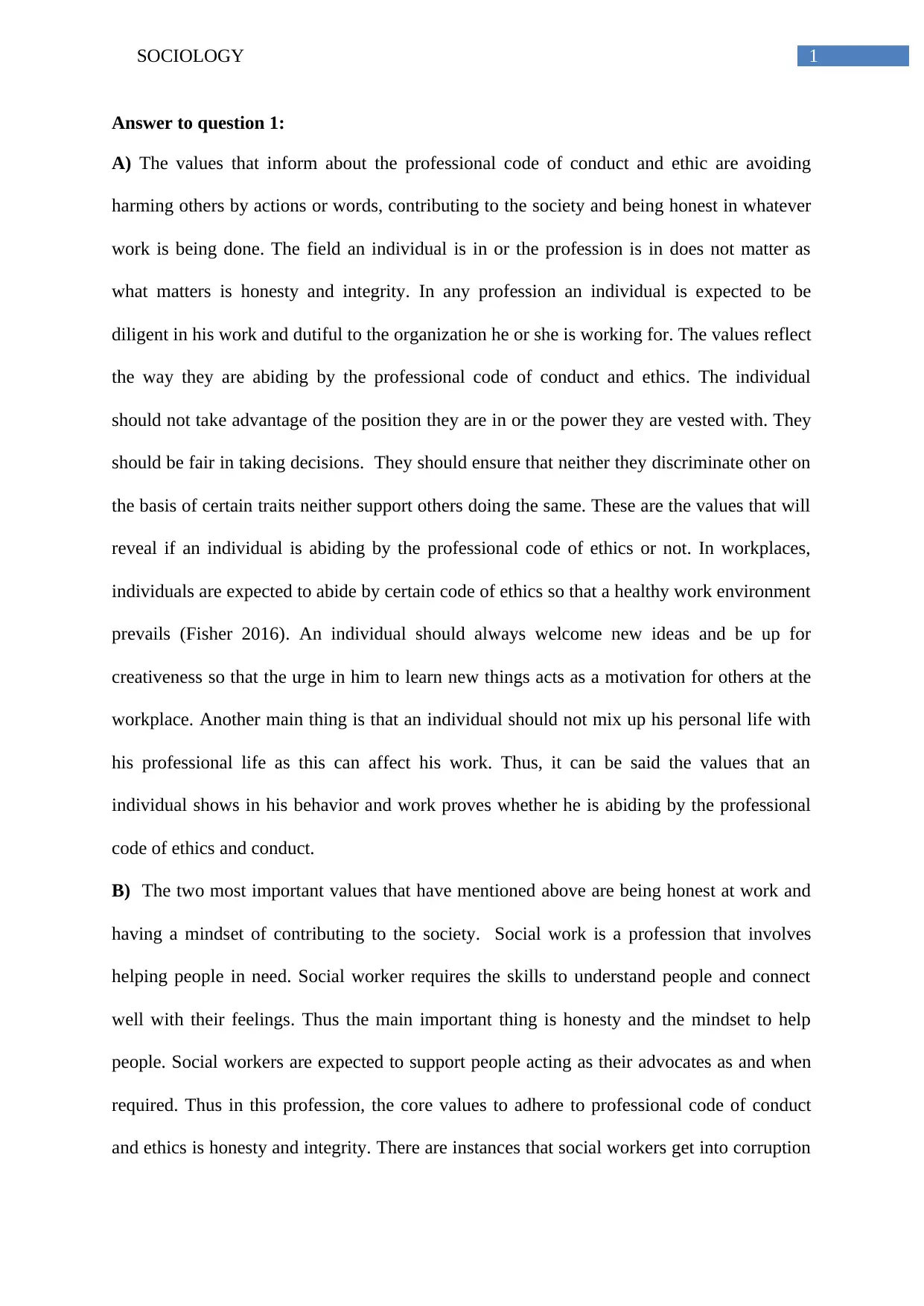
1SOCIOLOGY
Answer to question 1:
A) The values that inform about the professional code of conduct and ethic are avoiding
harming others by actions or words, contributing to the society and being honest in whatever
work is being done. The field an individual is in or the profession is in does not matter as
what matters is honesty and integrity. In any profession an individual is expected to be
diligent in his work and dutiful to the organization he or she is working for. The values reflect
the way they are abiding by the professional code of conduct and ethics. The individual
should not take advantage of the position they are in or the power they are vested with. They
should be fair in taking decisions. They should ensure that neither they discriminate other on
the basis of certain traits neither support others doing the same. These are the values that will
reveal if an individual is abiding by the professional code of ethics or not. In workplaces,
individuals are expected to abide by certain code of ethics so that a healthy work environment
prevails (Fisher 2016). An individual should always welcome new ideas and be up for
creativeness so that the urge in him to learn new things acts as a motivation for others at the
workplace. Another main thing is that an individual should not mix up his personal life with
his professional life as this can affect his work. Thus, it can be said the values that an
individual shows in his behavior and work proves whether he is abiding by the professional
code of ethics and conduct.
B) The two most important values that have mentioned above are being honest at work and
having a mindset of contributing to the society. Social work is a profession that involves
helping people in need. Social worker requires the skills to understand people and connect
well with their feelings. Thus the main important thing is honesty and the mindset to help
people. Social workers are expected to support people acting as their advocates as and when
required. Thus in this profession, the core values to adhere to professional code of conduct
and ethics is honesty and integrity. There are instances that social workers get into corruption
Answer to question 1:
A) The values that inform about the professional code of conduct and ethic are avoiding
harming others by actions or words, contributing to the society and being honest in whatever
work is being done. The field an individual is in or the profession is in does not matter as
what matters is honesty and integrity. In any profession an individual is expected to be
diligent in his work and dutiful to the organization he or she is working for. The values reflect
the way they are abiding by the professional code of conduct and ethics. The individual
should not take advantage of the position they are in or the power they are vested with. They
should be fair in taking decisions. They should ensure that neither they discriminate other on
the basis of certain traits neither support others doing the same. These are the values that will
reveal if an individual is abiding by the professional code of ethics or not. In workplaces,
individuals are expected to abide by certain code of ethics so that a healthy work environment
prevails (Fisher 2016). An individual should always welcome new ideas and be up for
creativeness so that the urge in him to learn new things acts as a motivation for others at the
workplace. Another main thing is that an individual should not mix up his personal life with
his professional life as this can affect his work. Thus, it can be said the values that an
individual shows in his behavior and work proves whether he is abiding by the professional
code of ethics and conduct.
B) The two most important values that have mentioned above are being honest at work and
having a mindset of contributing to the society. Social work is a profession that involves
helping people in need. Social worker requires the skills to understand people and connect
well with their feelings. Thus the main important thing is honesty and the mindset to help
people. Social workers are expected to support people acting as their advocates as and when
required. Thus in this profession, the core values to adhere to professional code of conduct
and ethics is honesty and integrity. There are instances that social workers get into corruption
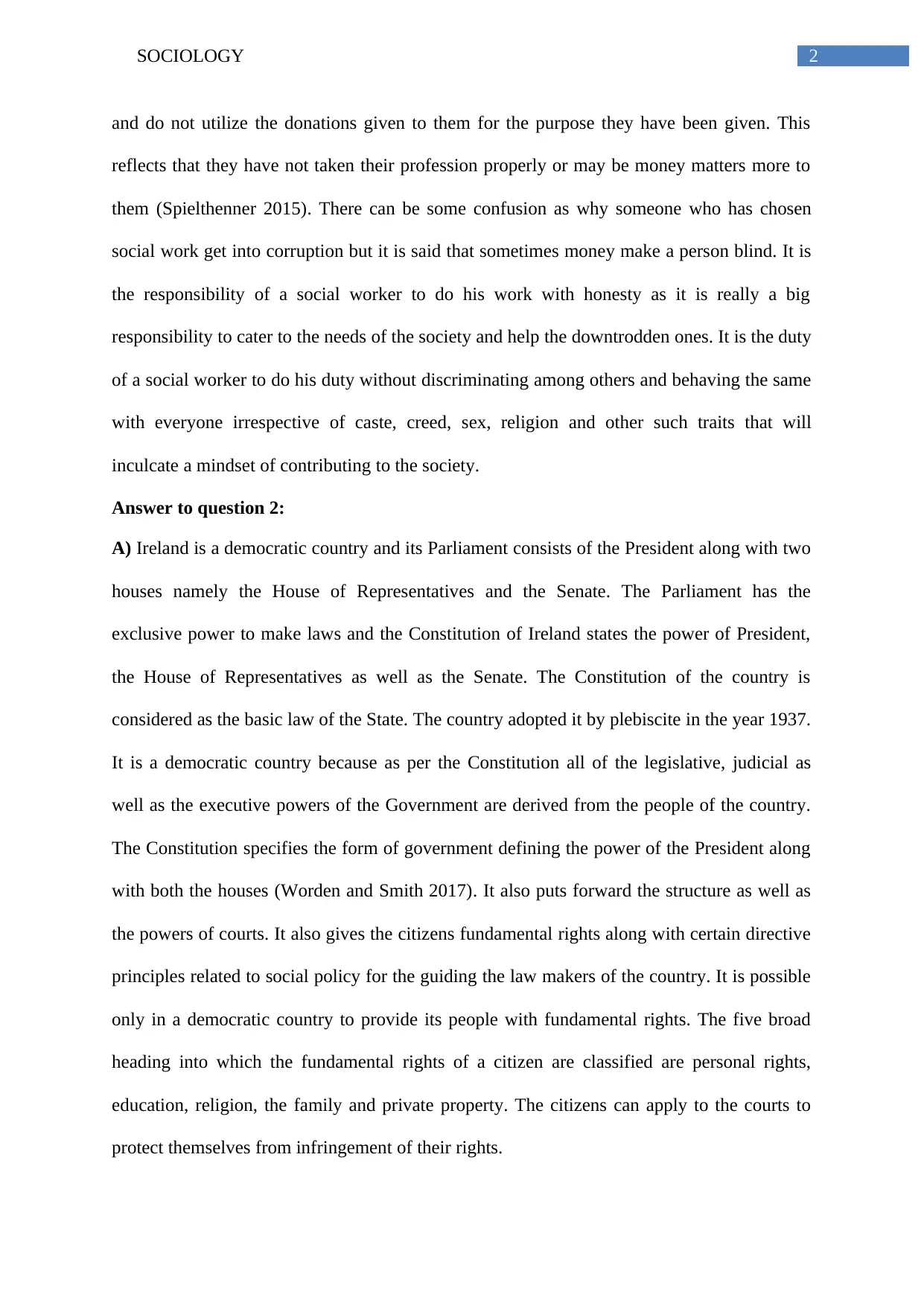
2SOCIOLOGY
and do not utilize the donations given to them for the purpose they have been given. This
reflects that they have not taken their profession properly or may be money matters more to
them (Spielthenner 2015). There can be some confusion as why someone who has chosen
social work get into corruption but it is said that sometimes money make a person blind. It is
the responsibility of a social worker to do his work with honesty as it is really a big
responsibility to cater to the needs of the society and help the downtrodden ones. It is the duty
of a social worker to do his duty without discriminating among others and behaving the same
with everyone irrespective of caste, creed, sex, religion and other such traits that will
inculcate a mindset of contributing to the society.
Answer to question 2:
A) Ireland is a democratic country and its Parliament consists of the President along with two
houses namely the House of Representatives and the Senate. The Parliament has the
exclusive power to make laws and the Constitution of Ireland states the power of President,
the House of Representatives as well as the Senate. The Constitution of the country is
considered as the basic law of the State. The country adopted it by plebiscite in the year 1937.
It is a democratic country because as per the Constitution all of the legislative, judicial as
well as the executive powers of the Government are derived from the people of the country.
The Constitution specifies the form of government defining the power of the President along
with both the houses (Worden and Smith 2017). It also puts forward the structure as well as
the powers of courts. It also gives the citizens fundamental rights along with certain directive
principles related to social policy for the guiding the law makers of the country. It is possible
only in a democratic country to provide its people with fundamental rights. The five broad
heading into which the fundamental rights of a citizen are classified are personal rights,
education, religion, the family and private property. The citizens can apply to the courts to
protect themselves from infringement of their rights.
and do not utilize the donations given to them for the purpose they have been given. This
reflects that they have not taken their profession properly or may be money matters more to
them (Spielthenner 2015). There can be some confusion as why someone who has chosen
social work get into corruption but it is said that sometimes money make a person blind. It is
the responsibility of a social worker to do his work with honesty as it is really a big
responsibility to cater to the needs of the society and help the downtrodden ones. It is the duty
of a social worker to do his duty without discriminating among others and behaving the same
with everyone irrespective of caste, creed, sex, religion and other such traits that will
inculcate a mindset of contributing to the society.
Answer to question 2:
A) Ireland is a democratic country and its Parliament consists of the President along with two
houses namely the House of Representatives and the Senate. The Parliament has the
exclusive power to make laws and the Constitution of Ireland states the power of President,
the House of Representatives as well as the Senate. The Constitution of the country is
considered as the basic law of the State. The country adopted it by plebiscite in the year 1937.
It is a democratic country because as per the Constitution all of the legislative, judicial as
well as the executive powers of the Government are derived from the people of the country.
The Constitution specifies the form of government defining the power of the President along
with both the houses (Worden and Smith 2017). It also puts forward the structure as well as
the powers of courts. It also gives the citizens fundamental rights along with certain directive
principles related to social policy for the guiding the law makers of the country. It is possible
only in a democratic country to provide its people with fundamental rights. The five broad
heading into which the fundamental rights of a citizen are classified are personal rights,
education, religion, the family and private property. The citizens can apply to the courts to
protect themselves from infringement of their rights.
⊘ This is a preview!⊘
Do you want full access?
Subscribe today to unlock all pages.

Trusted by 1+ million students worldwide
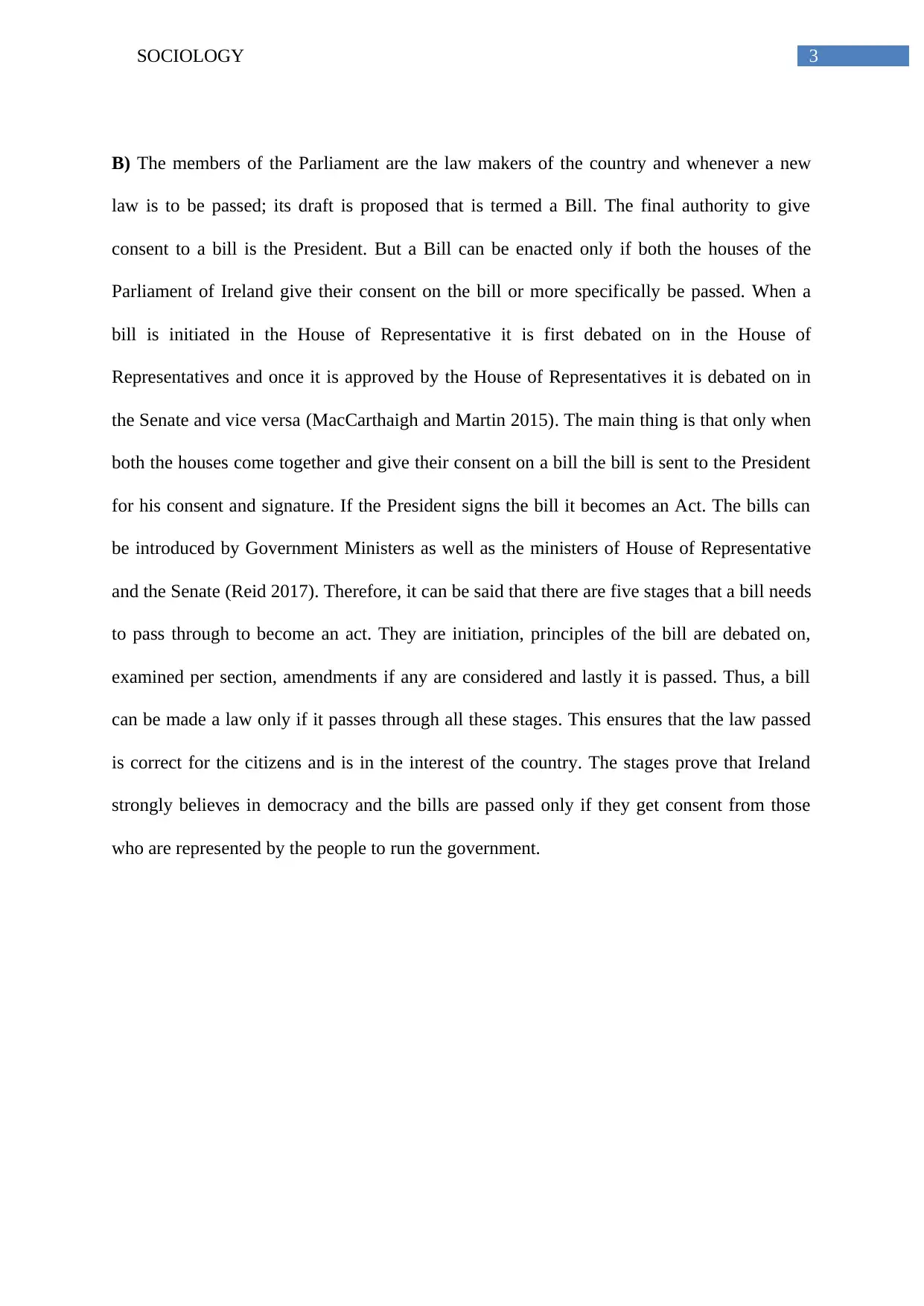
3SOCIOLOGY
B) The members of the Parliament are the law makers of the country and whenever a new
law is to be passed; its draft is proposed that is termed a Bill. The final authority to give
consent to a bill is the President. But a Bill can be enacted only if both the houses of the
Parliament of Ireland give their consent on the bill or more specifically be passed. When a
bill is initiated in the House of Representative it is first debated on in the House of
Representatives and once it is approved by the House of Representatives it is debated on in
the Senate and vice versa (MacCarthaigh and Martin 2015). The main thing is that only when
both the houses come together and give their consent on a bill the bill is sent to the President
for his consent and signature. If the President signs the bill it becomes an Act. The bills can
be introduced by Government Ministers as well as the ministers of House of Representative
and the Senate (Reid 2017). Therefore, it can be said that there are five stages that a bill needs
to pass through to become an act. They are initiation, principles of the bill are debated on,
examined per section, amendments if any are considered and lastly it is passed. Thus, a bill
can be made a law only if it passes through all these stages. This ensures that the law passed
is correct for the citizens and is in the interest of the country. The stages prove that Ireland
strongly believes in democracy and the bills are passed only if they get consent from those
who are represented by the people to run the government.
B) The members of the Parliament are the law makers of the country and whenever a new
law is to be passed; its draft is proposed that is termed a Bill. The final authority to give
consent to a bill is the President. But a Bill can be enacted only if both the houses of the
Parliament of Ireland give their consent on the bill or more specifically be passed. When a
bill is initiated in the House of Representative it is first debated on in the House of
Representatives and once it is approved by the House of Representatives it is debated on in
the Senate and vice versa (MacCarthaigh and Martin 2015). The main thing is that only when
both the houses come together and give their consent on a bill the bill is sent to the President
for his consent and signature. If the President signs the bill it becomes an Act. The bills can
be introduced by Government Ministers as well as the ministers of House of Representative
and the Senate (Reid 2017). Therefore, it can be said that there are five stages that a bill needs
to pass through to become an act. They are initiation, principles of the bill are debated on,
examined per section, amendments if any are considered and lastly it is passed. Thus, a bill
can be made a law only if it passes through all these stages. This ensures that the law passed
is correct for the citizens and is in the interest of the country. The stages prove that Ireland
strongly believes in democracy and the bills are passed only if they get consent from those
who are represented by the people to run the government.
Paraphrase This Document
Need a fresh take? Get an instant paraphrase of this document with our AI Paraphraser
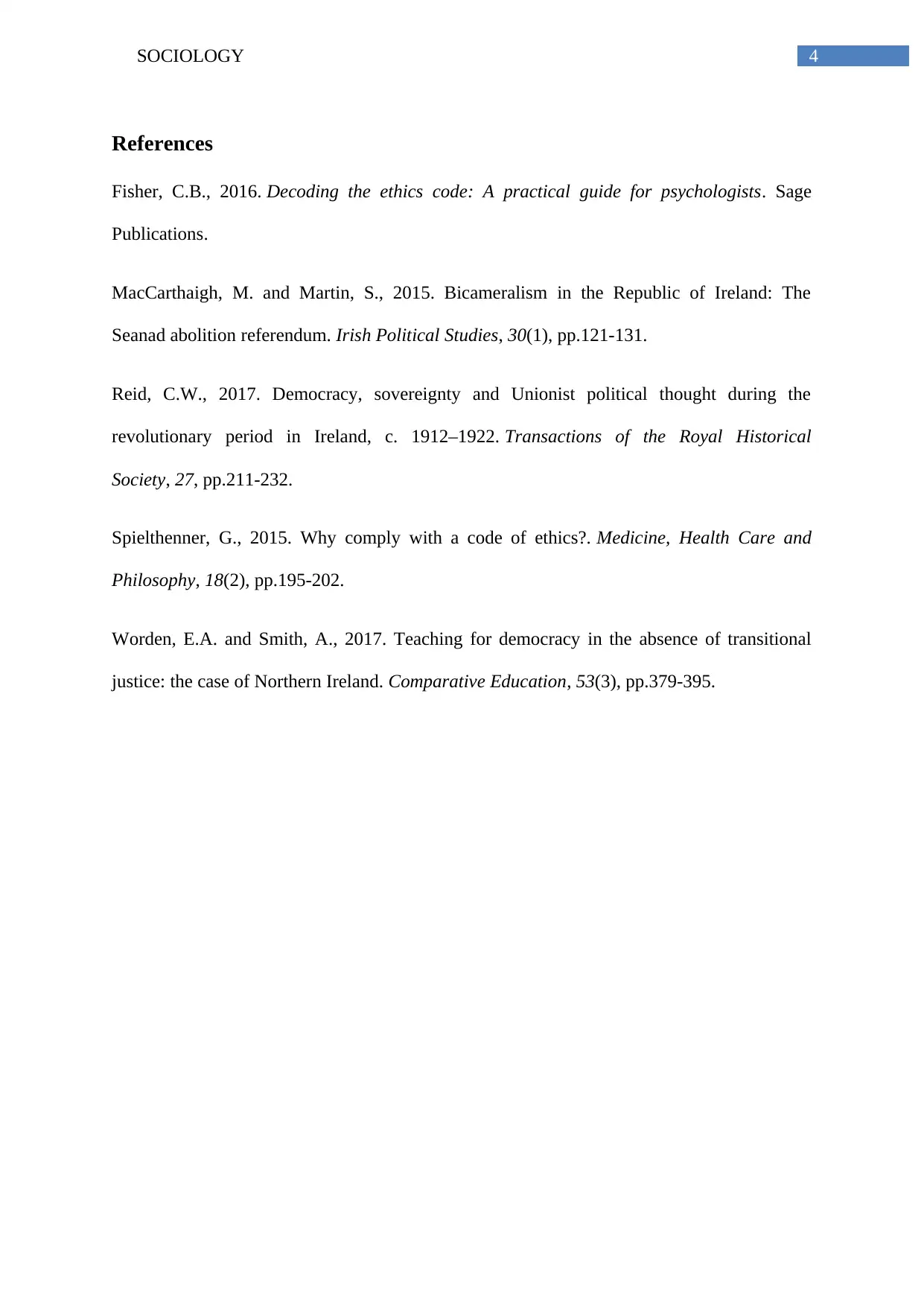
4SOCIOLOGY
References
Fisher, C.B., 2016. Decoding the ethics code: A practical guide for psychologists. Sage
Publications.
MacCarthaigh, M. and Martin, S., 2015. Bicameralism in the Republic of Ireland: The
Seanad abolition referendum. Irish Political Studies, 30(1), pp.121-131.
Reid, C.W., 2017. Democracy, sovereignty and Unionist political thought during the
revolutionary period in Ireland, c. 1912–1922. Transactions of the Royal Historical
Society, 27, pp.211-232.
Spielthenner, G., 2015. Why comply with a code of ethics?. Medicine, Health Care and
Philosophy, 18(2), pp.195-202.
Worden, E.A. and Smith, A., 2017. Teaching for democracy in the absence of transitional
justice: the case of Northern Ireland. Comparative Education, 53(3), pp.379-395.
References
Fisher, C.B., 2016. Decoding the ethics code: A practical guide for psychologists. Sage
Publications.
MacCarthaigh, M. and Martin, S., 2015. Bicameralism in the Republic of Ireland: The
Seanad abolition referendum. Irish Political Studies, 30(1), pp.121-131.
Reid, C.W., 2017. Democracy, sovereignty and Unionist political thought during the
revolutionary period in Ireland, c. 1912–1922. Transactions of the Royal Historical
Society, 27, pp.211-232.
Spielthenner, G., 2015. Why comply with a code of ethics?. Medicine, Health Care and
Philosophy, 18(2), pp.195-202.
Worden, E.A. and Smith, A., 2017. Teaching for democracy in the absence of transitional
justice: the case of Northern Ireland. Comparative Education, 53(3), pp.379-395.
1 out of 5
Related Documents
Your All-in-One AI-Powered Toolkit for Academic Success.
+13062052269
info@desklib.com
Available 24*7 on WhatsApp / Email
![[object Object]](/_next/static/media/star-bottom.7253800d.svg)
Unlock your academic potential
Copyright © 2020–2026 A2Z Services. All Rights Reserved. Developed and managed by ZUCOL.




